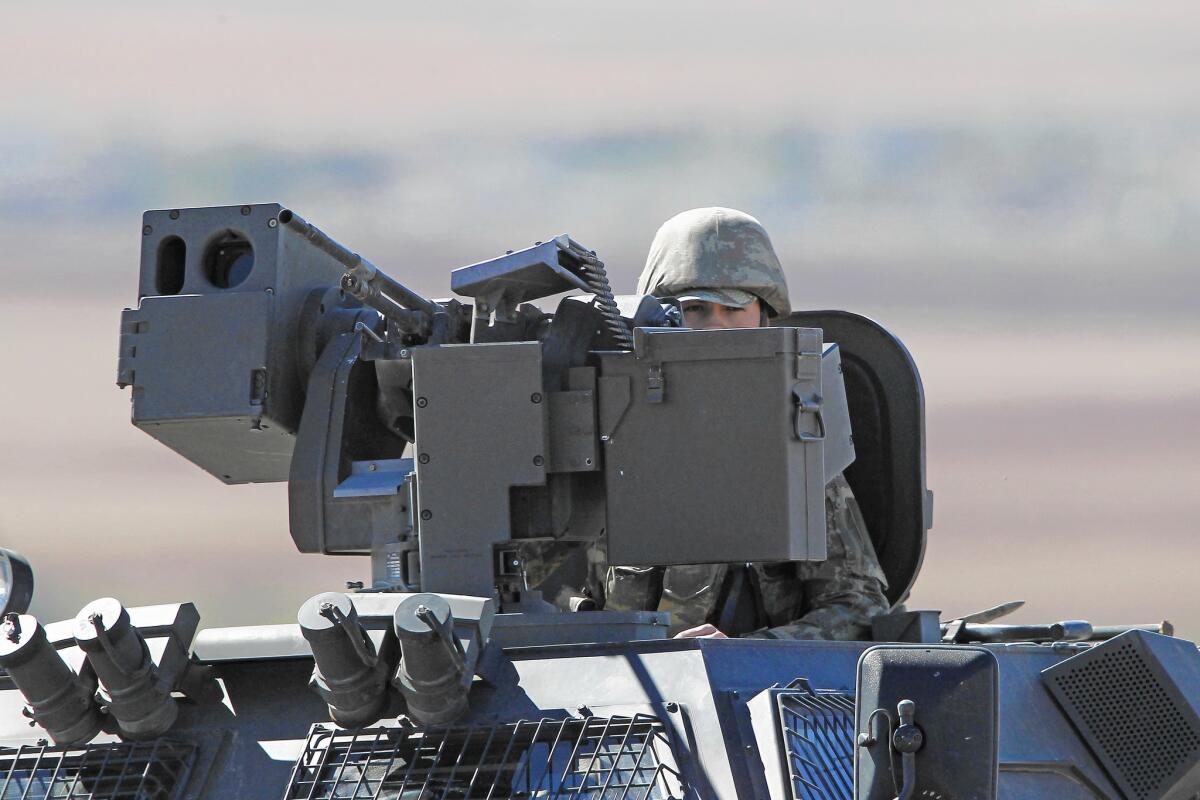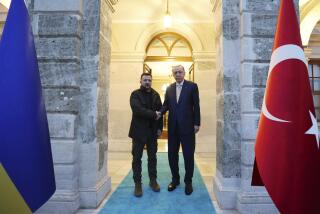Turkey to allow Iraqi Kurdish fighters passage into Syrian city

For weeks, Washington has been nudging a reluctant Turkey to assume a more forceful role in President Obama’s anti-militant coalition and come to the aid of Kurdish forces battling to push Islamic State fighters out of the besieged Syrian city of Kobani.
Turkey steadfastly refused international appeals to allow military assistance to reach the desperate Kurdish fighters. Turkish President Recep Tayyip Erdogan was wary of the Kurds and exasperated that his major foreign policy objective, the toppling of Syrian President Bashar Assad, had taken a back seat in Washington’s strategic calculus.
But the government abruptly changed its position Monday, announcing it will allow Iraqi Kurdish forces into Kobani, even as Washington launched airdrops of weapons, ammunition and medical supplies to the city in a major intensification of its military campaign.
“We are assisting peshmerga fighters to cross into Kobani,” Turkish Foreign Minister Mevlut Cavusoglu told reporters in Ankara, the capital, using the common name for Iraqi Kurdish forces.
The Turkish move was clearly a concession amid escalating demands at home and abroad that Turkey do something to help stave off an extremist takeover of Kobani. The remote border outpost has become a potent global symbol of the struggle against the extremist group Islamic State in Syria and neighboring Iraq.
Kurds were hopeful that an influx of forces and a relief corridor to the city could finally turn the tide in the monthlong battle.
“We need more Kurdish fighters and heavy weapons and we can do the job ourselves,” said Mohammad Mustafa, 45, a farm laborer from Kobani who was among many townsfolk gathered Monday on a hillside in Turkey watching the now-familiar columns of smoke rising from the city.
Kobani has seen an escalating series of U.S. airstrikes and, on Monday, U.S. airdrops to the city’s Kurdish defenders. Nevertheless, the Pentagon said Monday that “Kobani could still fall.”
The president of Iraq’s semiautonomous Kurdistan region, Massoud Barzani, had previously requested that Turkey allow peshmerga forces to pass through Turkish territory to relieve Kurdish militia fighters in Kobani.
The fact that the reinforcements would come from Iraqi Kurdistan — not from Turkish or Syrian Kurdish forces linked to the outlawed Kurdistan Workers Party, or PKK, long the nemesis of Ankara — was widely viewed as a way to mollify domestic groups opposed to any PKK involvement.
Turkish officials have been caught in the seemingly contradictory position of insisting they did not want Kobani to be overrun while refusing to take action to prevent its collapse. Turkish tanks and troops are arrayed in force just north of Kobani, but their focus is denying access to Kurdish fighters or aid destined for the beleaguered city.
On Monday, Turkish authorities again used tear gas to disperse Kurds seeking to deliver plastic bags of food to kin trapped in Kobani, just on the other side of the barbed-wire fence delineating the international boundary.
“We never wanted Kobani to fall, and we are trying to do our best to prevent it,” said Cavusoglu, the Turkish foreign minister.
It was the latest official effort to counter the public relations drubbing that the Turkish government has endured as daily images of Kobani are beamed to a global audience.
The U.S. escalation adds to the sense that Kobani has become a signature battle that the Obama administration does not want to lose. Increasingly, it seems, U.S. prestige is also at stake in the city, a place few outside the region had heard of until last month.
After weeks of airstrikes in the Kobani area — now numbering more than 130, by far the most anywhere in Syria or Iraq during the campaign against Islamic State — the Pentagon said Monday that it had commenced aerial drops to bolster the city’s Kurdish defenders. For weeks, Kurds have been calling for a resupply mission.
“However, the security situation in Kobani remains fragile, as ISIL continues to threaten the city and Kurdish forces continue to resist,” the Pentagon said, using a common acronym for Islamic State.
In devising a Kobani strategy, Turkey’s Erdogan not only has had to face pressure from Washington and other allies, he also has been obliged to navigate sundry domestic constituencies with often conflicting viewpoints on the Kobani crisis.
Many among Turkey’s ethnic Kurdish minority were outraged at what they call Ankara’s complicity in Kobani’s impending fall. Deadly riots this month in response to Turkey’s Kobani policy left dozens dead in some of the worst civil unrest in Turkey in years.
From the opposite perspective, many Turkish nationalists and Islamists are opposed to any hint of collaboration with the PKK. The militant Kurdish group, which embraces a leftist, secular outlook, has waged a three-decade war against the Turkish state in a fight for greater Kurdish autonomy.
The Kurdish militia heading the defense of Kobani has close links to the PKK, which Ankara and Washington consider a terrorist group. Ankara is alarmed at the emergence of several semiautonomous Kurdish cantons in northern Syria, a direct consequence of the Syrian conflict. Turkish officials view the regions as PKK recruiting grounds and possible launching pads for attacks against Turkey.
Still, the State Department acknowledged last week that it had held direct talks with the PKK Syrian political affiliate linked to the militia that is heading the defense of Kobani.
Turkey has held firm in its refusal to permit PKK or allied fighters to reinforce Kobani. At the same time, Turkish officials do not want to jeopardize ongoing peace talks with the PKK, a policy centerpiece of the administration of Erdogan’s Justice and Development Party. Nor do they want to stoke domestic instability.
With so many conflicting interests and alliances, Ankara has chosen a course that it deems an acceptable middle ground: allowing in peshmerga forces from Iraq.
State Department spokeswoman Marie Harf said Monday that U.S. officials “welcome” the Turkish Foreign Ministry statement that Ankara planned to facilitate the passage of Iraqi Kurdish peshmerga into Kobani. “We’ll keep working with them on this,” she said.
In theory, the Turkish move could placate both Turkey’s Kurdish minority and the many Turks deeply suspicious of Kurdish demands for greater autonomy.
Ankara has strong relations and close business ties with Iraqi Kurdistan. For Ankara, inviting in Iraqi Kurdish forces appears to have been the most satisfactory solution to a thorny political and diplomatic dilemma.
Still, some observers wonder whether the columns of Iraqi peshmerga forces will arrive any time soon in Kobani. The leaders of the Iraqi and Syrian Kurdish communities have long been at political and ideological loggerheads, despite broad Kurdish solidarity over the fate of Kobani.
“This peshmerga stuff may just be window dressing,” said Henri J. Barkey, professor of international relations at Lehigh University and a Turkey expert. “The Turks feel terribly cornered at the moment. They are really behind the eight ball.”
Special correspondent Nabih Bulos contributed to this report.
More to Read
Start your day right
Sign up for Essential California for news, features and recommendations from the L.A. Times and beyond in your inbox six days a week.
You may occasionally receive promotional content from the Los Angeles Times.






